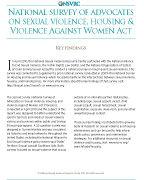Yon Je Louvri: Reducing Vulnerability to Sexual Violence in Haiti’s IDP Camps
This report presents findings on the intersections between food access, water, sanitation, housing and the incidence of sexual violence in camps for displaced persons outside of Port-au-Prince, Haiti. It also provides recommendations for action to improve access to basic needs and prevent sexual violence.
Publish Date
2012

 Safe, affordable housing is not only a basic human right and need; safe, affordable housing is a critical component of the healing process for sexual violence victims and survivors.
Safe, affordable housing is not only a basic human right and need; safe, affordable housing is a critical component of the healing process for sexual violence victims and survivors.